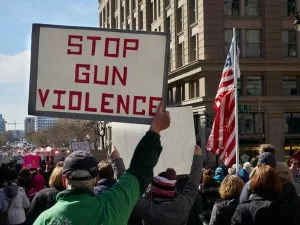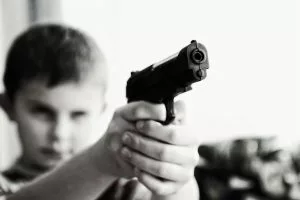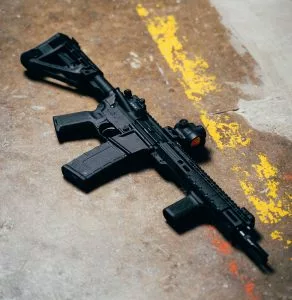
A new bill has passed the Illinois General Assembly that will help make it easier for victims of gun violence to receive justice, and to protect Illinois residents before they experience the horrifying consequences of gun violence themselves. Both the Illinois House of Representatives and Senate have passed the Bill, and Governor J.B. Pritzker only needs to add his signature for the Bill to officially become law. Pritzker has already confirmed his intention to do so.
House Bill 218, also referred to as the Firearm Industry Responsibility Act, aims to open gun manufacturers to civil lawsuits from the Illinois Attorney General and citizens of Illinois for marketing their products fraudulently or deceptively. The law specifically outlaws gun advertising, manufacture, or sale that encourages illegal paramilitary activity or targets children under 18.
Illinois’ Firearm Industry Responsibility Act intends to define the limits of the Protection of Lawful Commerce in Arms Act (PCLAA) passed by the Bush Administration in 2005, which has been wrongfully used by the National Rifle Association (NRA) and lawmaking groups as a means of sheltering gun manufactures from any legal accountability or consequence when their guns are used for criminal activity.

The new Illinois bill follows the example of laws that have passed in places like New York, allowing the state to sue any member of the gun industry it believes behaved in a way that “[created, maintained or contributed] to a condition…that endangers the safety or health of the public.” The New York Bill leaves the specifics vague, allowing anyone responsible for the “illegal or unreasonable sale, manufacture, distribution, importing or marketing of firearms” to be sued by the attorney general or members of the general public as a “public nuisance.”
However, Illinois’ Firearm Industry Responsibility Act is an amendment to the Illinois Consumer Fraud and Deceptive Business Practices Act (ICFA). The ICFA protects Illinois citizens from many different sorts of dishonest business practices, from false advertising, to concealing business information, to misrepresenting products, and many other manipulative tactics. The Firearm Industry Responsibility Act is written to clarify that the firearms industry has always been subject to the ICFA. The bill focuses specifically on the marketing aspect of the gun industry, opening gun manufacturers to litigation for consumer fraud and deceptive business practices.
The firearm industry has claimed that the PCLAA makes it immune to the ICFA. The Firearm Industry Responsibility Act emphatically states that this is not the case. “No single industry should be given a free pass to engage in unlawful, unfair or deceptive conduct,” said Illinois Attorney General Kwame Raoul about his House Bill 218. The ICFA has similarly been used to hold bad actors legally responsible in various industries: opioid manufacturers, tobacco companies, and predatory lenders have all faced civil lawsuits from both the Illinois Attorney General and the general population for violations of the ICFA.
Gun violence across America is out of control, and only getting worse. Many of the current trends date to the early 2000s, when the “War on Terror” began a period of increased militarization, alongside the 2004 ending of the United States’ federal assault weapons ban, and the passage of the PCLAA a year later. In 2006, the production of AR-15 rifles accounted for more than 5% of the total guns manufactured in the United States for the first time. It has continued to grow ever since, reaching as high as 25% of total manufacture in 2019. Of the 10 deadliest shootings since 2010, 7 involved the AR-15, including Sandy Hook, the Pulse Night Club, the Las Vegas music festival, Parkland High School, and Robb Elementary School.

The Ar-15 craze has gone so far that the Illinois gun manufacturer Wee 1 Tactical has marketed itself around a scaled-down AR-15 designed for and marketed to children, called the JR-15. These guns are not children’s toys. JR-15 ads say that their “smaller, safer, lighter” assault rifle “looks, feels, and operates just like Mom and Dad’s gun.” Skulls and crossbones featuring children’s skulls, complete with pacifiers and pigtails, decorated the side of the ad page.
The JR-15 is an extreme example, but it shows how far above the law the gun industry sees itself. It feels ludicrous to imagine, for example, a tobacco company advertising to children – and it is illegal for them to do so. In Illinois, a person must be 21 to purchase or possess a firearm, the same age restriction as tobacco, yet gun manufacturers feel completely comfortable targeting their products directly to children. The PCLAA has been treated as a blank check for weapons manufacturers that not only protects them from direct prosecution in the event of a shooting, but from any legal accountability at all. This immunity is not written into the PCLAA and it is unconscionable and disturbing that it has been used by the NRA, Congress, and the U.S. Judicial System to embolden gun manufacturers whose actions have led to an epidemic of American gun violence and mass shootings.
With House Bill 218, Illinois has joined a growing number of states and individuals pushing back against gun manufacturers, demanding accountability, and justice. Advertising in the gun industry that encourages illegal militia activity or targets children is not only a slap in the face to victims of gun violence, but dangerous. If the gun industry isn’t made to change its behavior by legislation such as Illinois’ Firearm Industry Responsibility Act, then the rampant mass shootings which occur daily in this country will never stop.
At The Collins Law Firm, we applaud Attorney General Kwame Raoul for initiating House Bill 218, and representatives Jennifer Gong-Gershowitz and Kam Buckner and Senator Don Harmon for their sponsorship of the bill in the Illinois General Assembly. Laws such as this are absolutely necessary to begin righting the wrongs caused by the American gun industry and the institutions that have allowed them to run unchecked for so long.

"*" indicates required fields